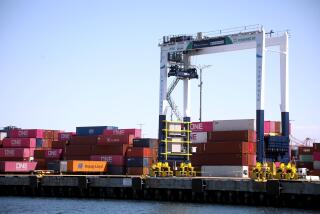GM Forms Fuel Cell Partnership
- Share via
WARREN, Mich. — Seeking an upper hand in the crowded field of fuel cell research, General Motors Corp. said Tuesday that it is taking a 20% stake in Irvine-based Quantum Technologies, a leader in the technology essential to powering autos by hydrogen.
The equity partnership will help GM develop experimental fuel cell vehicles with greatly increased range of up to 500 miles, said Larry Burns, GM’s vice president for research and development. Financial terms were not disclosed.
Fuel cells convert hydrocarbons such as gasoline or methanol into hydrogen, which is used to run battery-powered motors. The only byproduct of the process is water, so the vehicles are nonpolluting.
If successfully commercialized, fuel cells will have a profound effect on the environment because they eliminate noxious emissions and greenhouse gases that contribute to global warming. Burns said he believes there can be “hundreds of thousands” of fuel-cell-powered vehicles on the road by 2010.
“GM absolutely sees the long-term future of the transportation industry based on hydrogen,” Burns said at a presentation at GM’s Technical Center in this suburb just north of Detroit. “And not just the automobile, but the energy infrastructure of the entire world.”
Fuel cells still face numerous technological barriers, including handling, storing and delivering hydrogen to consumers. GM is pursuing fuel cells based on gasoline, for which there already are delivery systems in place in the form of gas stations, and fuel cells that run on already-separated hydrogen.
Current technology allows storage of hydrogen at 5,000 pounds per square inch, providing enough fuel to give a vehicle a range of up to 250 miles, Burns said. By comparison, a conventional internal combustion engine provides a range of 350 miles to 400 miles.
Quantum is on the verge of providing containers to hold hydrogen at 10,000 pounds per square inch, delivering a range of 300 miles to 500 miles. Such containers should be available in experimental cars by the end of this year, said Syed Hussain, chief executive of Quantum, a wholly owned subsidiary of Impco Technologies Inc.
Quantum’s high-pressure hydrogen container, about the size of a large watermelon, is built with a polymer liner, tough carbon fiber layer and a fiber-resin external shell, all proprietary technologies. It is highly resistant to impact, and its outer shell, made of a Kevlar-like material similar to bulletproof vests, also has strong anti-corrosive properties, Hussain said.
The first commercial, volume applications of fuel cells are likely not to be Chevrolet or Pontiac vehicles, but rather transit buses “where we could introduce fueling in more concentrated fashion,” Burns said.
More to Read
Inside the business of entertainment
The Wide Shot brings you news, analysis and insights on everything from streaming wars to production — and what it all means for the future.
You may occasionally receive promotional content from the Los Angeles Times.










